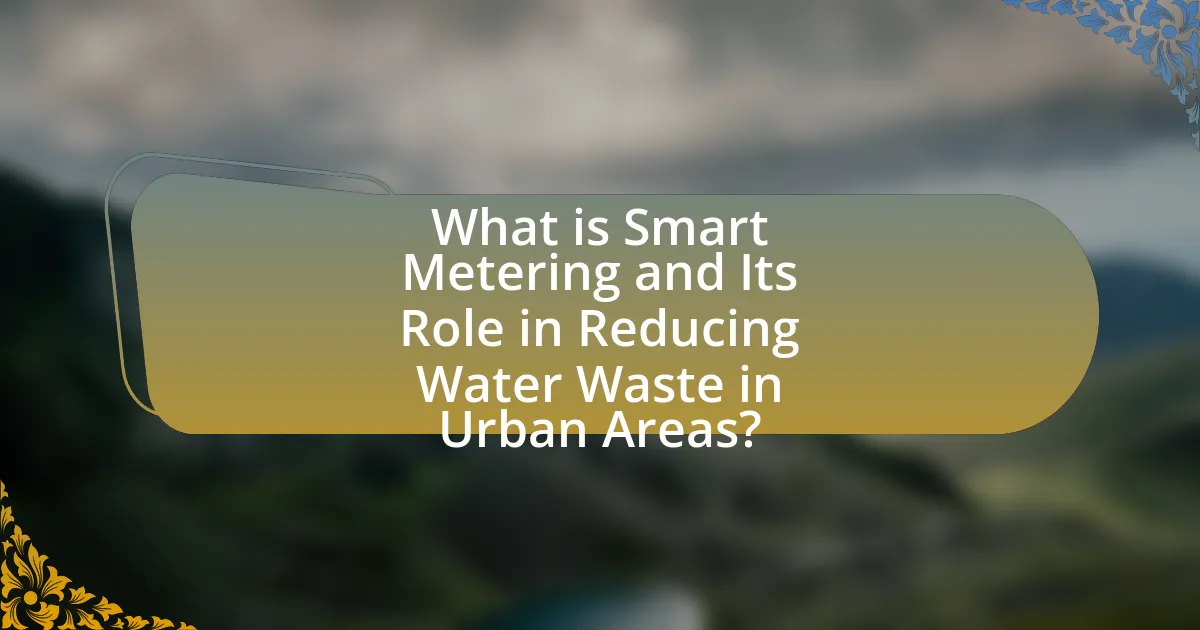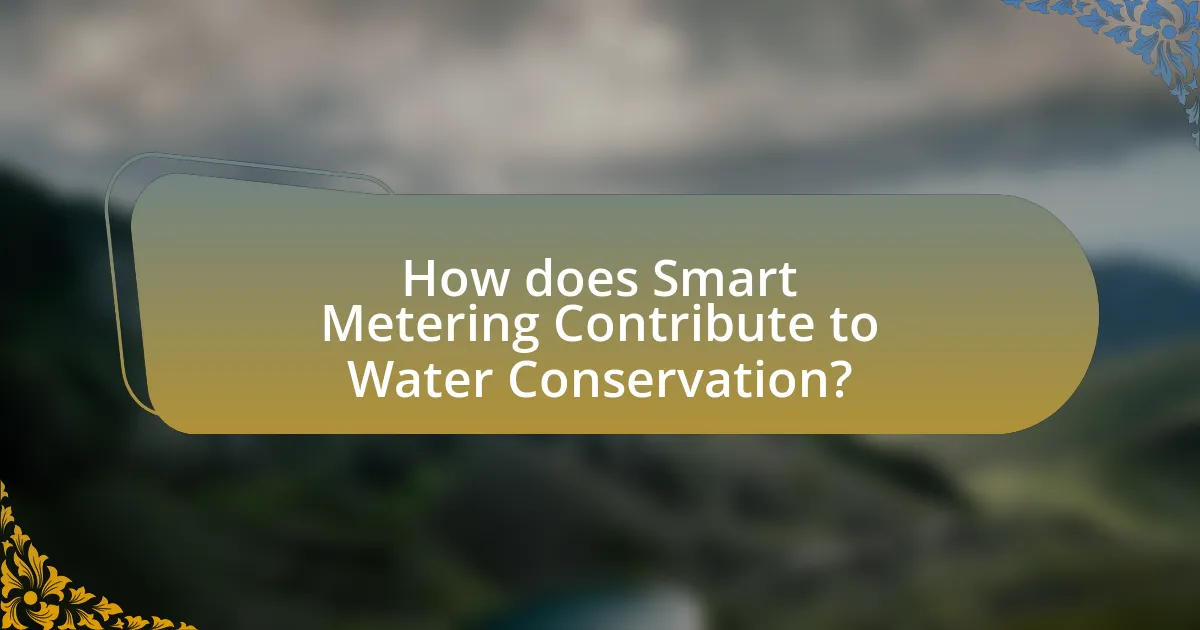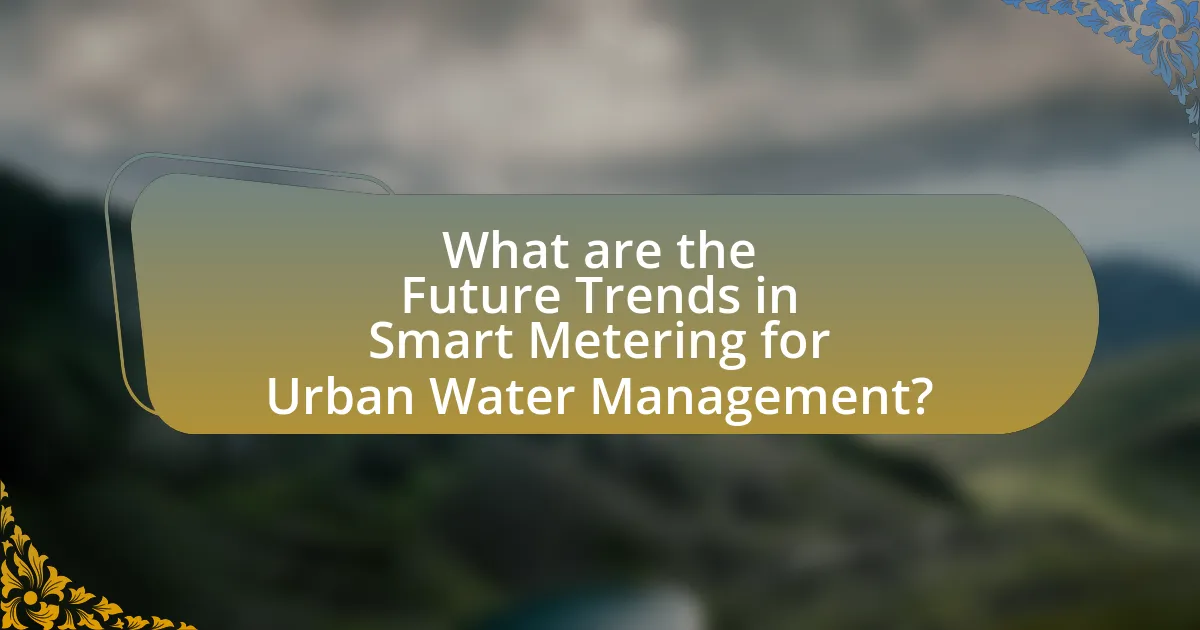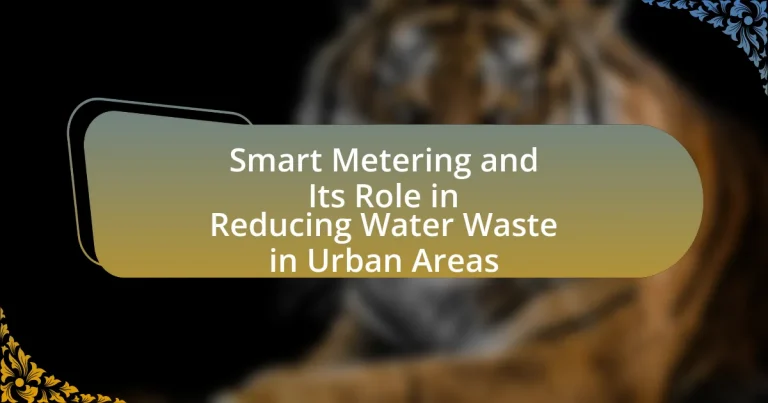Smart metering is a digital technology that measures and records water consumption in real-time, significantly contributing to the reduction of water waste in urban areas. By providing detailed insights into consumption patterns, smart meters enable timely leak detection and efficient resource management, leading to potential water savings of up to 15%. The article explores the functioning of smart metering systems, their key components, and the environmental and infrastructural challenges posed by water waste in cities. It also discusses the role of consumer awareness, the benefits of real-time data, and future trends in smart metering technology, emphasizing the importance of effective implementation strategies to enhance urban water management.

What is Smart Metering and Its Role in Reducing Water Waste in Urban Areas?
Smart metering refers to the use of digital technology to measure and record water consumption in real-time, allowing for more accurate billing and monitoring of water usage. This technology plays a crucial role in reducing water waste in urban areas by providing consumers and utilities with detailed insights into water consumption patterns, enabling timely detection of leaks and inefficiencies. For instance, studies have shown that cities implementing smart metering systems can reduce water consumption by up to 15% due to improved awareness and management of water resources. Additionally, smart meters facilitate demand management strategies, allowing utilities to optimize water distribution and reduce overall waste.
How does smart metering technology function in urban water systems?
Smart metering technology functions in urban water systems by utilizing advanced sensors and communication networks to monitor water usage in real-time. This technology enables utilities to collect accurate consumption data, detect leaks, and optimize water distribution. For instance, smart meters transmit usage information wirelessly to utility companies, allowing for immediate analysis and response to anomalies, such as sudden spikes in water usage that may indicate a leak. Studies have shown that the implementation of smart metering can lead to a reduction in water waste by up to 15%, as it empowers consumers with detailed insights into their water consumption patterns, encouraging more efficient usage.
What are the key components of smart metering systems?
The key components of smart metering systems include advanced metering infrastructure (AMI), communication networks, data management systems, and smart meters. Advanced metering infrastructure consists of the hardware and software that facilitate the collection and analysis of consumption data. Communication networks enable the transmission of data between smart meters and utility providers, often utilizing wireless technologies. Data management systems process and analyze the collected data, providing insights for both consumers and utilities. Smart meters themselves are equipped with sensors and communication capabilities to measure and report usage in real-time, enhancing efficiency and accuracy in billing. These components work together to optimize resource management and reduce waste, particularly in urban water systems.
How do smart meters collect and transmit data?
Smart meters collect and transmit data through advanced communication technologies, primarily using wireless networks. These devices measure consumption metrics such as water usage in real-time and send this information to utility companies via secure radio frequency or cellular networks. The data transmission occurs at regular intervals, allowing for accurate monitoring and analysis of consumption patterns. This method enhances operational efficiency and supports timely billing, ultimately contributing to water conservation efforts in urban areas.
Why is reducing water waste important in urban areas?
Reducing water waste is crucial in urban areas because it conserves a vital resource, ensuring sustainable water supply for growing populations. Urban areas often face increased demand for water due to high population density and industrial activities, leading to potential shortages. According to the United Nations, cities account for about 70% of global water use, highlighting the need for efficient management. Additionally, reducing water waste can lower utility costs for residents and municipalities, as less water treatment and distribution is required. Implementing smart metering technologies can enhance monitoring and management of water usage, further supporting conservation efforts.
What are the environmental impacts of water waste in cities?
Water waste in cities leads to significant environmental impacts, including depletion of local water resources, increased energy consumption, and degradation of ecosystems. The excessive use of water can result in lower water levels in rivers and lakes, which affects aquatic life and biodiversity. Additionally, the treatment and distribution of water require substantial energy, contributing to greenhouse gas emissions; for instance, the U.S. Environmental Protection Agency estimates that water-related energy use accounts for about 20% of total energy consumption in the country. Furthermore, water waste can lead to soil erosion and contamination, as excess runoff carries pollutants into waterways, harming both terrestrial and aquatic ecosystems.
How does water waste affect urban infrastructure and resources?
Water waste significantly strains urban infrastructure and resources by increasing the demand on water supply systems and leading to higher operational costs. When excessive water is wasted, it necessitates more extensive treatment and distribution efforts, which can overwhelm existing infrastructure, resulting in leaks and system failures. For instance, the American Society of Civil Engineers estimates that water main breaks cost cities approximately $2.8 billion annually in repairs and lost water. Additionally, wasted water can exacerbate issues related to stormwater management, leading to flooding and pollution in urban areas. This increased pressure on resources can hinder sustainable urban development and strain budgets, diverting funds from other critical infrastructure projects.
What challenges do urban areas face in managing water resources?
Urban areas face significant challenges in managing water resources, primarily due to population density, infrastructure limitations, and climate variability. High population density leads to increased water demand, often outpacing supply capabilities. Infrastructure limitations, such as aging pipes and inefficient distribution systems, contribute to substantial water loss, with estimates indicating that urban water systems can lose up to 30% of their supply through leaks. Additionally, climate variability results in unpredictable rainfall patterns, complicating water resource planning and management. These factors collectively hinder effective water resource management in urban settings.
How do population growth and urbanization contribute to water waste?
Population growth and urbanization significantly contribute to water waste by increasing demand for water resources and straining existing infrastructure. As urban areas expand, the concentration of people leads to higher water consumption for domestic, industrial, and agricultural purposes. This heightened demand often results in inefficient water use practices, such as over-irrigation and leaks in aging pipelines, which are exacerbated by the rapid pace of urban development. According to the United Nations, urban areas are expected to house 68% of the global population by 2050, intensifying the pressure on water systems and leading to an estimated 30-50% increase in water waste if not managed properly.
What are the limitations of traditional water metering methods?
Traditional water metering methods have several limitations, including inaccuracies in measurement, lack of real-time data, and high maintenance costs. Inaccurate measurements can arise from mechanical wear and tear, leading to underreporting or overreporting of water usage. Additionally, traditional meters typically do not provide real-time data, which hinders timely detection of leaks or unusual consumption patterns. High maintenance costs are associated with manual readings and the need for periodic calibration or replacement of aging meters. These limitations can result in inefficient water management and increased water waste in urban areas.

How does Smart Metering Contribute to Water Conservation?
Smart metering contributes to water conservation by providing real-time data on water usage, enabling consumers and utilities to identify and reduce waste. This technology allows users to monitor their consumption patterns, leading to more informed decisions about water use. According to a study by the American Water Works Association, smart metering can reduce water consumption by up to 15% by promoting awareness and encouraging conservation behaviors. Additionally, utilities can detect leaks and inefficiencies more quickly, further minimizing water loss.
What data insights can smart meters provide for water management?
Smart meters provide critical data insights for water management by enabling real-time monitoring of water usage patterns. These devices track consumption at granular levels, allowing utilities to identify peak usage times, detect leaks, and analyze trends over time. For instance, a study by the American Water Works Association found that smart meters can reduce water loss by up to 20% through early leak detection. Additionally, smart meters facilitate demand forecasting and help in optimizing water distribution, ultimately leading to more efficient resource management.
How can real-time data help identify leaks and inefficiencies?
Real-time data can help identify leaks and inefficiencies by providing immediate insights into water usage patterns and anomalies. Smart meters collect and transmit data continuously, allowing for the detection of unusual spikes in consumption that may indicate leaks. For instance, a study by the American Water Works Association found that real-time monitoring can reduce water loss by up to 30% by enabling prompt responses to identified issues. This immediate feedback loop allows utilities to address inefficiencies quickly, minimizing waste and optimizing resource management.
What role does consumer awareness play in water conservation efforts?
Consumer awareness plays a crucial role in water conservation efforts by empowering individuals to make informed decisions about their water usage. When consumers are educated about the impact of their water consumption, they are more likely to adopt water-saving practices, such as fixing leaks, using water-efficient appliances, and reducing unnecessary water use. Studies indicate that informed consumers can reduce their water usage by up to 20% when they understand the importance of conservation and the specific actions they can take. This awareness is often enhanced through initiatives like smart metering, which provides real-time data on water consumption, allowing consumers to track their usage and identify areas for improvement.
How can smart metering systems optimize water usage?
Smart metering systems optimize water usage by providing real-time data on consumption patterns, enabling users to monitor and adjust their water use effectively. These systems utilize advanced technology to track water flow and detect leaks, which can lead to significant reductions in waste. For instance, a study by the American Water Works Association found that implementing smart meters can reduce water consumption by up to 15% in urban areas, as users become more aware of their usage habits and can respond accordingly. Additionally, smart metering facilitates dynamic pricing models, encouraging users to conserve water during peak demand times, further enhancing overall efficiency in water management.
What are the benefits of automated alerts for consumers?
Automated alerts provide consumers with timely notifications about their water usage, enabling them to monitor and manage consumption effectively. These alerts help identify unusual spikes in usage, which may indicate leaks or inefficiencies, allowing for prompt action to prevent water waste. Additionally, automated alerts can inform consumers about their usage patterns, encouraging more sustainable habits and potentially leading to reduced water bills. Studies show that consumers who receive regular usage alerts can decrease their water consumption by up to 15%, demonstrating the effectiveness of this technology in promoting conservation.
How can smart metering facilitate demand management strategies?
Smart metering facilitates demand management strategies by providing real-time data on water usage, enabling utilities to monitor consumption patterns and adjust supply accordingly. This technology allows for precise tracking of water usage, which helps identify peak demand periods and encourages users to modify their consumption behaviors. For instance, studies have shown that the implementation of smart meters can lead to a reduction in water usage by up to 15% as consumers become more aware of their consumption habits. Additionally, smart metering supports dynamic pricing models, incentivizing users to shift their usage to off-peak times, further optimizing resource management.

What are the Future Trends in Smart Metering for Urban Water Management?
Future trends in smart metering for urban water management include the integration of advanced analytics, real-time monitoring, and IoT connectivity. These technologies enable utilities to optimize water distribution, detect leaks promptly, and enhance customer engagement through personalized consumption data. For instance, the global smart water meter market is projected to grow significantly, with a compound annual growth rate (CAGR) of over 20% from 2021 to 2026, indicating a strong shift towards digital solutions in water management. Additionally, the adoption of machine learning algorithms will facilitate predictive maintenance and improve resource allocation, further driving efficiency in urban water systems.
How is technology evolving in the field of smart metering?
Technology in the field of smart metering is evolving through advancements in connectivity, data analytics, and integration with IoT devices. These developments enable real-time monitoring and management of resource consumption, significantly enhancing efficiency. For instance, the adoption of wireless communication technologies, such as LoRaWAN and NB-IoT, allows for more reliable data transmission over long distances, which is crucial for urban environments. Additionally, machine learning algorithms are increasingly used to analyze consumption patterns, helping utilities predict demand and identify leaks more effectively. According to a report by MarketsandMarkets, the global smart water metering market is projected to grow from $3.5 billion in 2020 to $7.5 billion by 2025, indicating a strong trend towards the adoption of these technologies.
What innovations are being developed to enhance smart metering systems?
Innovations being developed to enhance smart metering systems include advanced data analytics, integration of Internet of Things (IoT) technology, and improved communication protocols. Advanced data analytics allows for real-time monitoring and predictive maintenance, which can significantly reduce water waste by identifying leaks and inefficiencies quickly. The integration of IoT technology enables smart meters to communicate seamlessly with other devices and systems, facilitating better resource management. Improved communication protocols, such as Low Power Wide Area Networks (LPWAN), enhance the reliability and range of data transmission, ensuring accurate and timely information is available for decision-making. These innovations collectively contribute to more efficient water usage and management in urban areas.
How can artificial intelligence improve water management through smart metering?
Artificial intelligence can improve water management through smart metering by enabling real-time data analysis and predictive analytics. Smart meters equipped with AI algorithms can monitor water usage patterns, detect leaks, and optimize water distribution, leading to significant reductions in waste. For instance, a study by the American Water Works Association found that utilities implementing AI-driven smart metering systems reduced water loss by up to 30%. This efficiency not only conserves water resources but also enhances operational efficiency for water utilities, ultimately supporting sustainable urban water management.
What are the potential barriers to widespread adoption of smart metering?
The potential barriers to widespread adoption of smart metering include high initial costs, data privacy concerns, and lack of infrastructure. High initial costs can deter utilities and consumers from investing in smart metering technology, as the upfront expenses for installation and equipment can be significant. Data privacy concerns arise from the collection and transmission of detailed usage data, leading to fears about unauthorized access and misuse of personal information. Additionally, lack of infrastructure, particularly in older urban areas, can hinder the implementation of smart metering systems, as existing networks may require substantial upgrades to support new technologies. These barriers collectively impede the transition to smart metering, which is essential for reducing water waste in urban areas.
How can policy and regulation impact the implementation of smart metering?
Policy and regulation significantly impact the implementation of smart metering by establishing the legal framework and standards necessary for deployment. Regulatory bodies can mandate the adoption of smart metering technologies, ensuring that utilities invest in infrastructure that promotes efficiency and conservation. For instance, the Energy Policy Act of 2005 in the United States encouraged the use of advanced metering infrastructure, leading to increased adoption rates among utilities. Furthermore, policies that provide financial incentives or subsidies for smart meter installation can accelerate deployment, as seen in various European countries where governments have funded smart grid initiatives to enhance water and energy management. These regulations not only facilitate technological integration but also promote consumer engagement through transparent billing and usage data, ultimately contributing to reduced water waste in urban areas.
What strategies can be employed to overcome resistance to smart metering?
To overcome resistance to smart metering, utilities can implement comprehensive education and outreach programs that inform consumers about the benefits of smart meters, such as improved accuracy in billing and enhanced water conservation. Research indicates that when consumers understand how smart metering can lead to cost savings and better resource management, their acceptance increases significantly. For instance, a study by the American Water Works Association found that public awareness campaigns can reduce resistance by up to 30%. Additionally, providing incentives for early adopters and addressing privacy concerns through transparent data usage policies can further mitigate resistance.
What best practices can urban areas adopt for effective smart metering implementation?
Urban areas can adopt several best practices for effective smart metering implementation, including stakeholder engagement, data integration, and robust infrastructure development. Engaging stakeholders, such as residents and utility companies, ensures that the needs and concerns of all parties are addressed, fostering acceptance and collaboration. Data integration across various platforms allows for real-time monitoring and analysis, enhancing decision-making processes. Additionally, developing a robust infrastructure that supports the installation and maintenance of smart meters is crucial; for instance, cities like San Diego have successfully implemented smart water meters, resulting in a 10% reduction in water consumption. These practices collectively contribute to the efficient management of water resources and the reduction of waste in urban environments.


